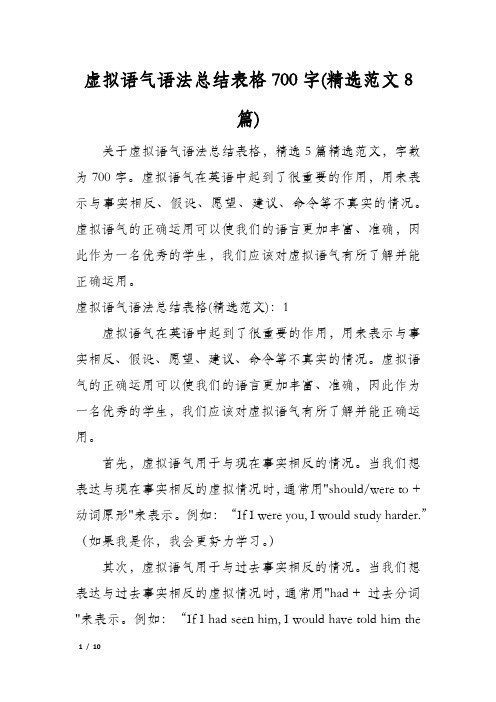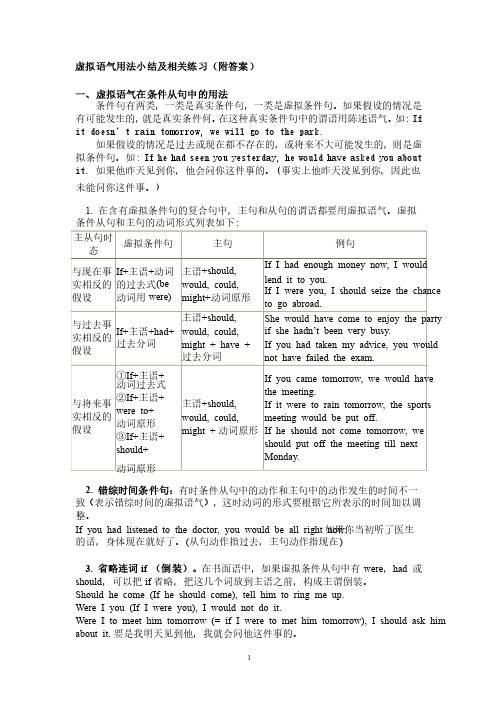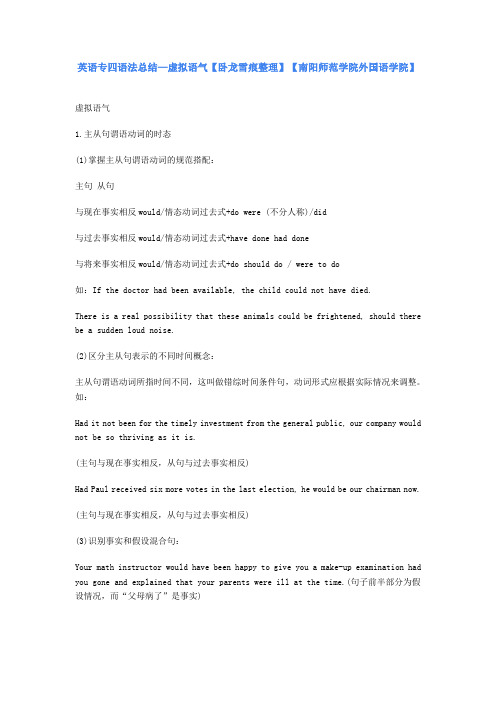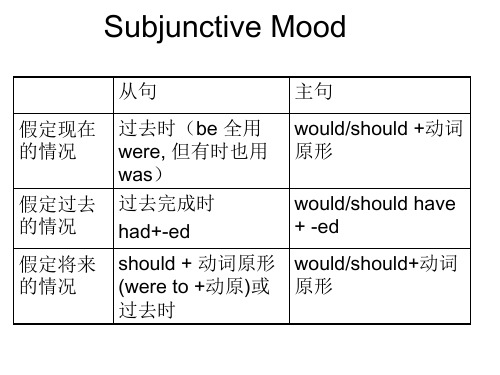专四-虚拟语气练习及小结
虚拟语气语法总结表格700字(精选范文8篇)

虚拟语气语法总结表格700字(精选范文8篇)关于虚拟语气语法总结表格,精选5篇精选范文,字数为700字。
虚拟语气在英语中起到了很重要的作用,用来表示与事实相反、假设、愿望、建议、命令等不真实的情况。
虚拟语气的正确运用可以使我们的语言更加丰富、准确,因此作为一名优秀的学生,我们应该对虚拟语气有所了解并能正确运用。
虚拟语气语法总结表格(精选范文):1虚拟语气在英语中起到了很重要的作用,用来表示与事实相反、假设、愿望、建议、命令等不真实的情况。
虚拟语气的正确运用可以使我们的语言更加丰富、准确,因此作为一名优秀的学生,我们应该对虚拟语气有所了解并能正确运用。
首先,虚拟语气用于与现在事实相反的情况。
当我们想表达与现在事实相反的虚拟情况时,通常用"should/were to +动词原形"来表示。
例如:“If I were you, I would study harder.”(如果我是你,我会更努力学习。
)其次,虚拟语气用于与过去事实相反的情况。
当我们想表达与过去事实相反的虚拟情况时,通常用"had + 过去分词"来表示。
例如:“If I had seen him, I would have told him thenews.”(如果我见到他,我会告诉他这个消息。
)除了上述两种情况外,虚拟语气还可以用于表达愿望、建议和命令等。
当我们想表达愿望时,可以使用“wish + 主语+过去式”。
例如:“I wish I had more time to travel.”(我希望我有更多时间去旅行。
)当我们想提出建议时,可以使用“suggest +(that)+主语+(should)+动词原形”。
例如:“I suggest that he should take a break.”(我建议他休息一下。
)当我们想表示命令时,可以使用“demand/order +(that)+主语+动词原形”。
虚拟语气用法小结及练习(附答案)

虚拟语气用法小结及相关练习(附答案)一、虚拟语气在条件从句中的用法 条件句有两类,条件句有两类,一类是真实条件句,一类是真实条件句,一类是真实条件句,一类是虚拟条件句。
一类是虚拟条件句。
一类是虚拟条件句。
如果假设的情况是如果假设的情况是有可能发生的,就是真实条件何。
在这种真实条件句中的谓语用陈述语气。
如: If it doesn’t rain tomorrow, we will go to the park.如果假设的情况是过去或现在都不存在的,如果假设的情况是过去或现在都不存在的,或将来不大可能发生的,或将来不大可能发生的,则是虚拟条件句。
如拟条件句。
如: : If he had seen you yesterday, yesterday, he he would have asked you about it. it. 如果他昨天见到你,他会问你这件事的。
如果他昨天见到你,他会问你这件事的。
(事实上他昨天没见到你,因此也未能问你这件事。
未能问你这件事。
) )1. 在含有虚拟条件句的复合句中,主句和从句的谓语都要用虚拟语气。
虚拟条件从句和主句的动词形式列表如下: 主从句时态虚拟条件句虚拟条件句 主句主句 例句例句 与现在事与现在事 实相反的实相反的 假设假设 If+主语+动词动词 的过去式(be 动词用were) 主语+should, would, could, might+动词原形动词原形 If I had enough money now, I would lend it to you. If I were you, I should seize the chance to go abroad. 与过去事与过去事 实相反的实相反的 假设假设 If+主语+had+ 过去分词过去分词 主语+should, would, could, might + have + 过去分词过去分词 She would have come to enjoy the party if she hadn’t been very busy. If you had taken my advice, you would not have failed the exam. 与将来事与将来事 实相反的实相反的 假设假设 ①If+主语+ 动词过去式动词过去式②If+主语+ were to+ 动词原形动词原形 ③If+主语+ should+ 动词原形动词原形 主语+should, would, could, might + 动词原形动词原形 If you came tomorrow, we would have the meeting. If it were to rain tomorrow, the sports meeting would be put off. If he should not come tomorrow, we should put off the meeting till next Monday. 2. 错综时间条件句:有时条件从句中的动作和主句中的动作发生的时间不一致(表示错综时间的虚拟语气)(表示错综时间的虚拟语气),,这时动词的形式要根据它所表示的时间加以调整。
专四语法专项训练虚拟语气

专四语法专项训练虚拟语气考点1. If从句中的虚拟语气省略if,从句的语序用到装,即将were,had或should移至主语的前面,但否定词not不前移。
1、与过去事实相反:从句sb had done,主句sb would(should,could,might)+ have done;1. Had Judy been more careful on the maths exam, she _could have got___ much better result s now.2008A. would be gettingB. could have gotC. must getD. would get2. He would have finished his college education, but he _had___to quit and finda job to support his family.2007A. had hadB. hasC. hadD. would have3._Had he not been taken good care of __, he would not have recovered so quickly.2005/1995A. Hadn't he been taken good care ofB. Had he not been taken good care ofC. Had not he been taken good care ofD. Had he been not taken good care of4. I _would have enjoyed__the party much more if there hadn’t been quite sucha crowd of people there.2004/1996A. would enjoyB. will have enjoyedC. would have enjoyedD. will be enjoying5. All of us would have enjoyed the party much more if there _had not been__ quite such a crowd of people there.2004/2000A. weren’tB. hasn’t beenC. hadn’t beenD. wouldn’t6. _Had it not been__for the fact that she broke her leg, she might have passed the exam.2002A. Had it not beenB. Hadn’t it beenC. Was it notD. Were it not7. _Given____enough time and money, the researchers would have been able to discover more in t his field.1998a. Givingb. To givec. Givend. Being given8. I was to have made a speech if_I had not been called away__.1997A. I was not called awayB. nobody would have called me awayC. I had not been called awayD. nobody called me away9. __Given___ time, he’ll make a first-class tennis player. 1996A. HavingB. GivenC. GivingD. Had10. We could _have provided__him with a detached house when he came, but he had specifically asked for a small flat.1995A. provideB. have providedC. not provideD. not have provided11. _Had I realized_____you were busy, I wouldn’t have bothered you with my questions. 1994A. If I realizedB. Had I realizedC. I realized thatD. As I realized12. _Had it not been for____ their help, we would not have succeeded.1992A. Hadn't been forB. Had it not been forC. It hadn't been forD. Had not it been for13. If you _had not been____ in such a hurry you would not have put sugar into the sauce instead of salt.1992A. were not, would not putB. were, would putC. had been, would have putD. had not been, would not have put14. "Did you hear of his death?'"Yes. If he _had been operated on__ in time, hemight nothave died___.”1990A. had been operated on, might not dieB. had been operated on, might not have diedC. were operated on, might not dieD. were operated on,- might not have died2、与现在事实相反:从句sb did(were),主句sb would(should, could, might)+do;1. If there were no subjunctive mood, English _would be____ much easier to learn.2009A. could have beenB. would beC. will beD. would have been2. “You _could_____ borrow my notes provided you take care of them,” I told my friend. 2007A. couldB. shouldC. mustD. can正确答案是陈述语序3. If you explained the situation to your solicitor, he _would be_______ able to advise you much better than I can.2005A. would beB. will have beenC. wasD. Were4. If I knew Japanese , I _would apply_____ for the position.1991A. would applyB. will applyC. may have appliedD. will have applied3、与将来事实相反:从句sb did (should+do或were+to do),主句sb would (should, could, might)+do。
英语专四语法总结—虚拟语气【卧龙雪痕】

英语专四语法总结—虚拟语气【卧龙雪痕整理】【南阳师范学院外国语学院】虚拟语气1.主从句谓语动词的时态(1)掌握主从句谓语动词的规范搭配:主句从句与现在事实相反would/情态动词过去式+do were (不分人称)/did与过去事实相反would/情态动词过去式+have done had done与将来事实相反would/情态动词过去式+do should do / were to do如:If the doctor had been available, the child could not have died.There is a real possibility that these animals could be frightened, should there be a sudden loud noise.(2)区分主从句表示的不同时间概念:主从句谓语动词所指时间不同,这叫做错综时间条件句,动词形式应根据实际情况来调整。
如:Had it not been for the timely investment from the general public, our company would not be so thriving as it is.(主句与现在事实相反,从句与过去事实相反)Had Paul received six more votes in the last election, he would be our chairman now.(主句与现在事实相反,从句与过去事实相反)(3)识别事实和假设混合句:Your math instructor would have been happy to give you a make-up examination had you gone and explained that your parents were ill at the time.(句子前半部分为假设情况,而“父母病了”是事实)I would have gone to visit him in the hospital had it been at all possible, but I was fully occupied the whole of last week.前半部分为假设,后半部分是事实)2.名词性从句的虚拟形式名词性从句是指宾语从句、主语从句、表语从句和同位语从句。
专业四级考试语法-虚拟语气(全).docx

Subjunctive Mood1. 语气 Mood语气是动词的一种形式,表示说话人对一事物和人的态度和看法。
包括陈述语气,祈使语气和虚拟语气三种。
陈述语气表示动作或状态是现实的、确定的或符合事实的,用于陈述句、疑问句和某些感叹句。
①T here are two sides to every question. 每个问题都有两个方面。
②Were you busy all day yesterday 昨天一整天你都很忙吗③How good a teacher she is! 她是多好的一位老师啊!祈使语气祈使语气:表示说话人对对方的请求或命令。
Never be late again! 再也不要迟到了。
Don’t forget to turn off the light.别忘了关灯。
虚拟语气表示动作或状态不是客观存在的事实,而是说话人的主观愿望、假设或推测等。
①I f I were a bird, I could fly in the air. 如果我是一只小鸟,我就能在空中飞行。
②I wish I could pass the examination. 我希望我能通过考试。
③May you succeed! 祝您成功!虚拟语气是动词的一种特殊形式,用来表达未能成为事实或者不可能成为事实的情况,或者在说话人看来实现可能性很小的情况。
此外还可用来表示命令、建议、设想、祝愿(或诅咒)等等,以及表达说话人的主观愿望。
时间从句谓语形式主句谓语形式动词过去式 (be 用 were)将来should +动词原形would / should / might / could +动词原形were to +动词原形现在动词过去式(be用were)would / should / might / could +动词原形过去had +动词过去分词情态动词 + have donecould have done本来可以- - -might have done本来可能- - -should / ought to have done本来应该做- - -shouldn ’ t / ought not to have done 本不该做- -would / should / might / could have +动词过去分词你本不应该告诉她真相。
专四语法重点题详解,虚拟语气

• If only the patient ______ a different treatment instead of using the antibiotics, he might still be alive now.(2007) • A. had received • B. received • C. should receive • D. were receiving • A
• _____, he would not have recovered so quickly. (1995) ) • A. Hadn’t he been taken good care of B. Had he not been taken good care of • C. Had not he been taken good care of D. Had he been not taken good care of • B
Examples
• The rapid change of society requires that college students adapt to the world outside campus by getting to know the society. • I would rather that you did nothing for the time being. • I wish that I were a student again. • I wished that I had followed his suggestion.
•
If you have really been studying English for so long, it’s about time you _____ able to write letters in English. (1999) A. should be B. were C. must be D. are B,it’s about time that sb. did sth. ,
专四虚拟语气总结(打印)

专四语法(虚拟语气)虚拟语气用来表示说话人的主观愿望或假想,所说的是一个条件,不一定是事实,或与事实相反。
条件句可分为两类,一类为真实条件句,一类为非真实条件句。
非真实条件句表示的是假设的或实际可能性不大的情况,故采用虚拟语气。
eg. If he comes, he will bring his violin.典型例题The volleyball match will be put off if it ___.A.will rainB. rainsC. rainedD. is rained答案B。
真实条件句主句为将来时,从句用一般现在时。
注意:1)在真实条件句中,主句不能用be going to表示将来,该用shall, will. (错) If you leave now, you are never going to regret it.(对) If you leave now, you will never regret it.2)表示真理时,主句谓语动词便不用shall (will) +动词原形,而直接用一般现在时的动词形式。
从句中提出一种与客观现实不相符或根本不可能存在的条件,主句会产生的一种不可能获得的结果。
条件句中的虚拟语气根据不同的时间有三种不同的形⏹If I had time, I would do it again.⏹If I had known of your arrival, I should have met you at the station.⏹If she had further considered the problem, she might have come to the correctconclusion.真题举例:1. All of us would have enjoyed the party much more if there _____ quite such a crowd people there.(00, 49)[C]A. weren’tB. hasn’t beenC. hadn’t beenD. w ouldn’t be2. If your car _____ during the first 12 months,take it to an authorized dealer.(98, 43)[B]A. shall needB. should needC. would needD. will need3. If there were no subjunctive mood, English _____ much easier to learn.(09, 52) [B]A. could have beenB. would beC. will beD. would have been4. _____ for the fact that she broke her leg, she might have passed the exam.(02, 60)[A]A. Had it not beenB. Hadn’t it beenC. Was it notD. Were it not5. If you explained the situation to your solicitor, he _____ able to advise you much better than I can. (05, 51) [A]A. would beB. will have beenC. wasD. were6. I was to have made a speech if _____. (97, 51) [C]A. I was not called awayB. nobody would have called me awayC. I had not been called awayD. nobody called me away当条件状语从句表示的行为和主句表示的行为所发生的时间不一致时,被称为:错综时间条件句,动词的形式要根据它所表示的时间做出相应的调整。
四级语法真题解析虚拟语气解析

四级语法真题解析虚拟语气解析四级语法真题解析——虚拟语气解析在四级英语考试中,语法是一个重要的考点,而虚拟语气作为其中的一部分,往往会引起考生的困扰。
本篇文章将从真题解析的角度,重点讲解四级考试中常见的虚拟语气用法和解题技巧。
1. 引导条件状语从句的虚拟语气在各类真题中,虚拟语气通常用于条件句中。
在条件句中,如果假设的条件与事实相反或者不可能实现,就要使用虚拟语气来表达。
例如,2019年6月份四级阅读真题中的一道题目是:"If you had learned to play a musical instrument as a child, you _____ playing one now."A. might have enjoyedB. might enjoyC. must have enjoyedD. would enjoy这道题目考察的就是过去的虚拟语气。
根据题意可知,主句中使用的是过去完成时态,在此基础上,我们需要使用与过去相反的虚拟语气形式。
因此,在条件从句中使用过去完成时态的虚拟语气,答案选项为A,即"If you had learned to play a musical instrument as a child, you might have enjoyed playing one now."2. 引导宾语从句的虚拟语气在四级考试中,虚拟语气有时也会用于宾语从句中。
特别是在一些形容情感、命令、建议等动词后面的宾语从句中,常见虚拟语气的运用。
例如,2019年12月份四级阅读真题中的一道题目是:"He recommended that the patient _____."A. sees a specialistB. will see a specialistC. saw a specialistD. see a specialist根据题目可知,主句中使用了虚拟语气动词"recommended",因此在宾语从句中需要使用虚拟语气形式。
- 1、下载文档前请自行甄别文档内容的完整性,平台不提供额外的编辑、内容补充、找答案等附加服务。
- 2、"仅部分预览"的文档,不可在线预览部分如存在完整性等问题,可反馈申请退款(可完整预览的文档不适用该条件!)。
- 3、如文档侵犯您的权益,请联系客服反馈,我们会尽快为您处理(人工客服工作时间:9:00-18:30)。
虚拟语气一、条件句中的虚拟语气1. 条件句中虚拟语气的形式从句中提出一种与客观现实不相符或根本不可能存在的条件,主句会产生的一种不可能获得的结果。
条件句中的虚拟语气根据不同的时间有三种不同的形式。
(1) 将来时的条件句中的虚拟语气。
如:If he should go to Qing Hua University, he would make full use of his time. 如果他要上清华大学的话,他就会充分利用他的时间了。
If he were to come here, he would tell us about it. 如果他要来的话,他会通知我们一声。
(2) 现在时的条件句中的虚拟语气。
如:If he were free, he would help us. 要是他有空的话,它会帮助我们的。
If he studied at this school, he would know you well. 如果他在这所学校学习的话,它会对你很熟悉。
(3) 过去时的条件句中的虚拟语气。
如:If I had seen the film, I would have told you about it. 我如果看过这场电影,我会把电影容告诉你了。
If I had got there earlier, I would have met Mr. Li. 如果我早点到那儿,我就会会到了先生。
3. 运用条件句中的虚拟语气时,须注意的几个问题(1) 当从句的主语为第三人称单数时,谓语动词若是系动词be时,可用was代替were。
但在倒装虚拟结构及if I were you, as it were中,只能用were。
如:Were I ten years younger, I would study abroad. 要是我还年轻十岁的话,我会去国外学习。
If I were you, I would try my best to grasp the chance. 要是我是你的话,我要尽力抓住这次机会。
(2) 有时,虚拟条件句中,主、从句的动作若不是同时发生时,须区别对待。
①从句的动作与过去事实相反,而主句的动作与现在或现在正在发生的事实不符。
如:If I had worked hard at school, I would be an engineer, too. 如果我在学校学习刻苦的话,我现在也会使工程师了If they had informed us, we would not come here now. 如果他们通知过我们的话,我们现在就不会来这里了。
②从句的动作与现在事实相反,而主句的动作与过去事实不符。
如:If he were free today, we would have sent him to Beijing. 如果他今天有空的话,我们会已经派他去了(from .yygrammar.)。
If he knew her, he would have greeted her. 要是他认识她的话,他肯定会去问候她了。
③从句的动作与过去发生的情况相反,而主句的动作与现在正在发生的情况相反。
如:If it had not been raining too much, the crops would be growing much better. 如果天不下太多的雨的话,庄家会长得更好。
If he had been working hard, he would be working in the office now. 要是他工作一直努力的话,他现在已进了办公室了。
(3) 当虚拟条件句的谓语动词含有were, should, had时,if可省略,而将were, should, had等词置于句首。
如:Should he agree to go there, we would send him there. 要是他答应去的话,我们就派他去。
Were she here, she would agree with us. 如果她在这儿的话,她会同意我们的。
Had he learnt about computers, we would have hired him to work here. 如果她懂一些电脑知识的话,我们会已经聘用他来这里工作了(from .yygrammar.)。
(4) 有时,句子没有直接给出假设情况的条件,而须通过上下文或其他方式来判断。
如:I would have come to see you, but I was too busy. 我本该来看你了,然而我太忙了。
But for his help, we would be working now. 要不是他的帮助,我们还会在工作呢。
Without your instruction, I would not have made such great progress. 要是没有你的指导,我不会取得如此大的进步。
(5) 有时,虚拟条件句中,主、从句可以省略其中的一个,来表示说话人的一种强烈的感情。
①省略从句He would have finished it. 他本该完成了。
You could have passed this exam. 你应该会通过这次考试了。
②省略主句If I were at home now. 要是我现在在家里该多好啊。
If only I had got it. 要是我得到它了该多好啊。
二、其他状语从句的虚拟语气1. 目的状语从句中的虚拟语气(1) 在for fear that, in case, lest引导的目的状语从句中,若用虚拟语气时,从句谓语为:should + 动词原形。
并且should不能省略She examined the door again for fear that a thief should come in. 她又把门检查了一遍,以防盗贼的进入。
He started out earlier lest he should be late. 他很早就出发了以防迟到。
(2) 在so that, in order that所引导的目的状语从句中,从句中的谓语为:can / may / could / might / will / would / should + 动词原形。
如(from .yygrammar.):He goes closer to the speaker so that he can hear him clearer. 他走近说话的人以便能挺得更清楚。
He read the letter carefully in order that he should not miss a word. 他把信读得很仔细以便不漏掉一个单词。
2. 让步状语从句中的虚拟语气(1) 在even if, even though 所引导的让步状语从句中,可用虚拟语气,主句、从句的结构与if所引导的条件从句结构相同。
如:Even if he were here himself, he should not know what to do. 即使他亲自来也不知该怎么办。
Nobody could save him even though Hua T uo should come here. 即使华佗在世也救不了他。
(2) 在whatever,whichever,whenever,whoever, wherever,however, no matter wh-word 等引导的让步状语从句中,从句虚拟语气结构为:使用MAY①may +动词原形(指现在或将来)。
如:We will finish it on time no matter what / whatever may happen. 不管发生什么事,我们都要按时完成。
We will find him wherever / no matter where he may be. 无论他在哪里,我们都要找到他。
I will wait for him no matter how late he may come. 不管他来的多么晚,我都会等他。
②may +完成式(指过去) ,主句结构不限。
如:You mustn’t be proud whatever / no matter what great progress you may have made. 不管你取得了多么大的进步,你也不能骄傲(from .yygrammar.)。
We must respect him no matter what / whatever mistakes he may have made. 不管他翻过什么错误,我们必须尊敬他。
(3) 在though, although等引导的让步状语从句中,从句虚拟语气结构为should +动词原形,主句结构不限。
如:Although / Though he should often be late, he is a good student. 尽管他经常迟到,他还是个好学生。
Although / Though he should be secretary, he must obey the rules. 尽管他是书记,他也必须遵守规定。
3. 方式状语从句中的虚拟语气例如:They began to talk warmly as if they had known each other for long. 他们开始热烈的谈论起来就好像他们已相互认识很久了。
He coughed twice as if someone should come. 他咳嗽两声就好像有人要来了。
4. 原因状语从句中的虚拟语气amazed, angry, annoyed, astonished, disappointed, frightened, happy, pleased, proud, sorry, surprised,upset等后面的状语从句中常用虚拟语气。
其虚拟语气的结构为:①should + 原形动词(指现在或将来)。
如:He was angry that you should call him by name. 他很生气,你竟然对他直呼其名。
I was astonished that he should not answer such an easy question. 我很惊讶他竟答不出如此简单的问题。
②should + 完成式, 指过去。
如:I’m very sorry that you should have failed the exam. 我很遗憾,你这次考试竟然失败了。
